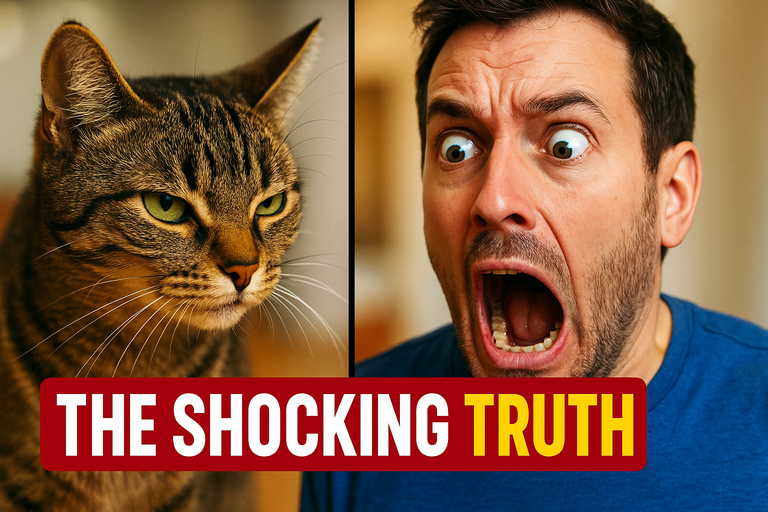
Picture this: You're sipping your oat milk latte, scrolling through adorable cat memes, and planning your future family. Suddenly, a headline leaps off the screen: "This Cat Poop Parasite Can Decapitate Sperm—and It Might Be Fueling Infertility" (Gizmodo). Wait, what? Was that a typo, or has Garfield declared war on baby-makers everywhere?
Welcome to the wild, weird world of Toxoplasma gondii—an unassuming parasite that’s making waves (and not the good kind) in the world of fertility science.
The Kitty Litter Conspiracy: Why Your Cat Is Suddenly a Suspect
Let’s cut to the chase: cats, those fluffy overlords of your living room, are the main hosts for Toxoplasma gondii. This single-celled party crasher lurks in cat poop, and, according to new research, it’s not just interested in causing vague flu-like symptoms. No, this parasite has a peculiar talent—it can shred sperm (source).
That’s right. Scientists just uncovered that T. gondii doesn’t just hang out in your intestines. It can literally decapitate sperm, turning those heroic swimmers into, well... casualties. Is it any wonder that male fertility is on a mysterious decline?
Are You at Risk? (Hint: If You Have a Cat, Maybe)
You might be thinking, “Sure, but how likely is this to affect me?” Let’s review:
- Have you scooped a litter box lately?
- Do you snack without washing your hands after pet cuddles?
- Is your cat’s main hobby ‘redecorating’ the house with mysterious dirt patches?
If you answered “yes” to any of these, congratulations—T. gondii may already be eyeing you (or more worryingly, your reproductive cells) for its next round of microscopic mischief.
Don’t panic! Here’s the real kicker: most people infected with T. gondii don’t have any serious symptoms. But for those on the baby-making journey, this research sheds light on a new—and previously overlooked—villain in the fertility drama.
Sperm Under Siege: What’s Actually Happening?
New findings suggest that T. gondii can cause sperm to lose their heads… literally. In lab studies, exposed sperm were less motile (that means slower swimmers for those skipping biology class) and suffered actual physical damage.
Why does this matter? Low motility and fragmented sperm are two big contributors to unexplained male infertility. And, in a world where sperm counts are already dropping (thanks, stressful jobs and microplastics), we really don’t need cats joining Team Infertility.
Can You Still Cuddle Mr. Whiskers? Protecting Your Dreams (and Your Swimmers)
Let’s be honest: no one’s giving up their cat. (If anything, Millennial and Gen Z pet parents are doubling down on feline devotion this year.) So what’s a prospective parent to do?
Here’s your action plan:
- Wash your hands after handling kitty litter and before meals. Basic? Yes. Effective? Absolutely.
- Delegate litter box duty during preconception months (finally, a legit reason to have your partner do it).
- Keep cats indoors to reduce their exposure to T. gondii in the first place.
- Handle raw meat carefully (T. gondii isn’t just a cat thing—undercooked meat can harbor it, too).
But what about the sperm that are already under siege?
Taking Back Control: The Home Insemination Solution
Enter the modern miracle of at-home insemination kits. In an era when fertility clinics are overwhelmed and privacy is precious, more people are turning to solutions that put them back in the driver’s seat. Kits like those you’ll find in the MakeAMom Resource Library offer science-backed, reusable tools that are sensitive to sperm health and user needs—whether you’re dealing with low motility, sensitivities, or you just want to keep things private and on your schedule.
Why does this matter? Because handling sperm with care is more critical than ever! MakeAMom’s options like the Impregnator kit (perfect for low motility sperm, which, as you now know, might be a stealth symptom of T. gondii’s handiwork) let you optimize your chances without the clinical pressure or the mystery of what might be lurking under the microscope.
Besides, with a reported 67% average success rate, you can breathe a little easier (while still scrubbing your hands, of course).
The Bottom Line: Cats Aren’t Cancelled, Just Be Smart
So, should you send your cat back to the shelter? Absolutely not. (Besides, who else is going to knock your water glass off the nightstand at 3 a.m.?) Instead, just be mindful. Now that “cat poop parasite” is in your fertility vocabulary, you’ve taken a giant leap toward proactive parenthood.
Maybe the real takeaway here is this: fertility is complicated, surprising, and sometimes, yes, a little stinky. But you’ve got options. From better hygiene habits to innovative home insemination tools, the path to parenthood is more in your control than ever.
Curious about optimizing your fertility journey at home? Check out the science-driven advice and practical support at MakeAMom’s website—because sometimes, winning the sperm race is all about having the right game plan (and keeping the cat out of the end zone).
What do you think—are you surprised by the “cat connection” to fertility? Would you rethink your preconception prep? Let us know in the comments, and share this post with the cat lovers in your life!